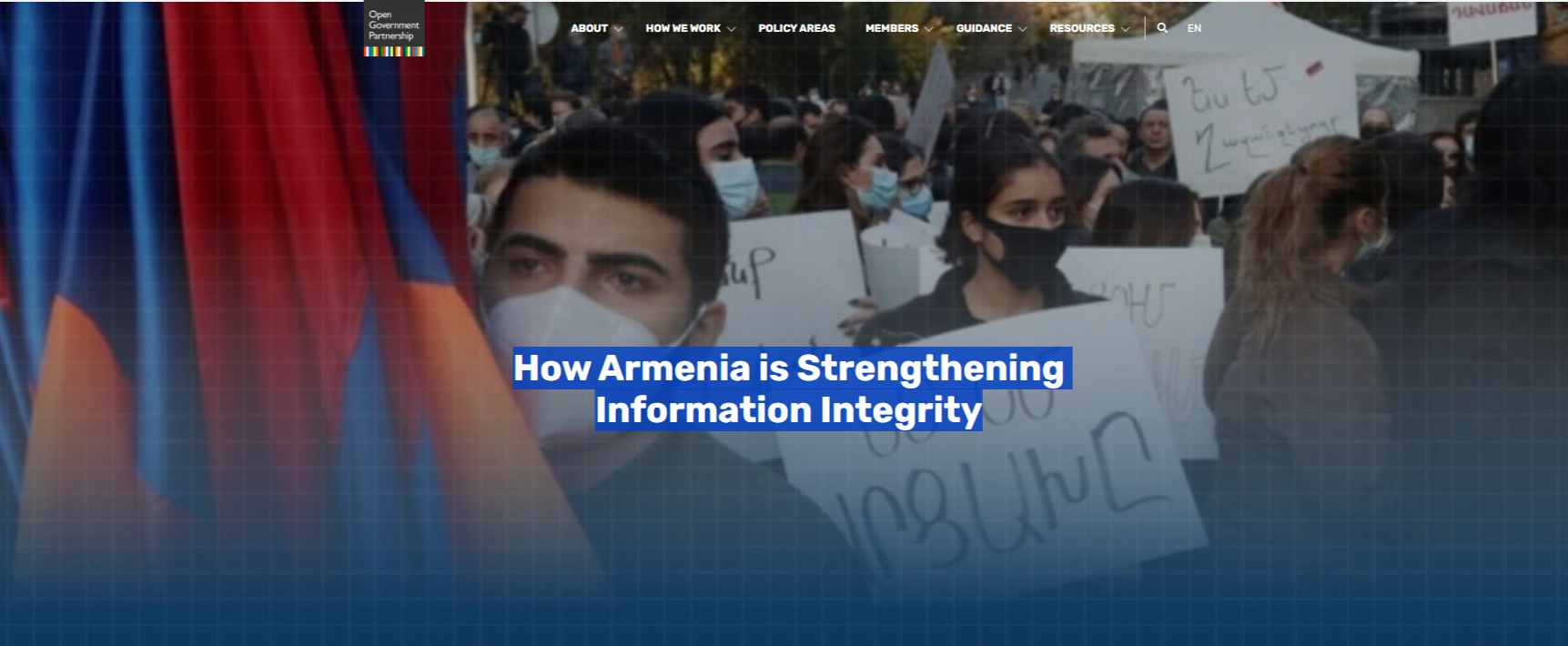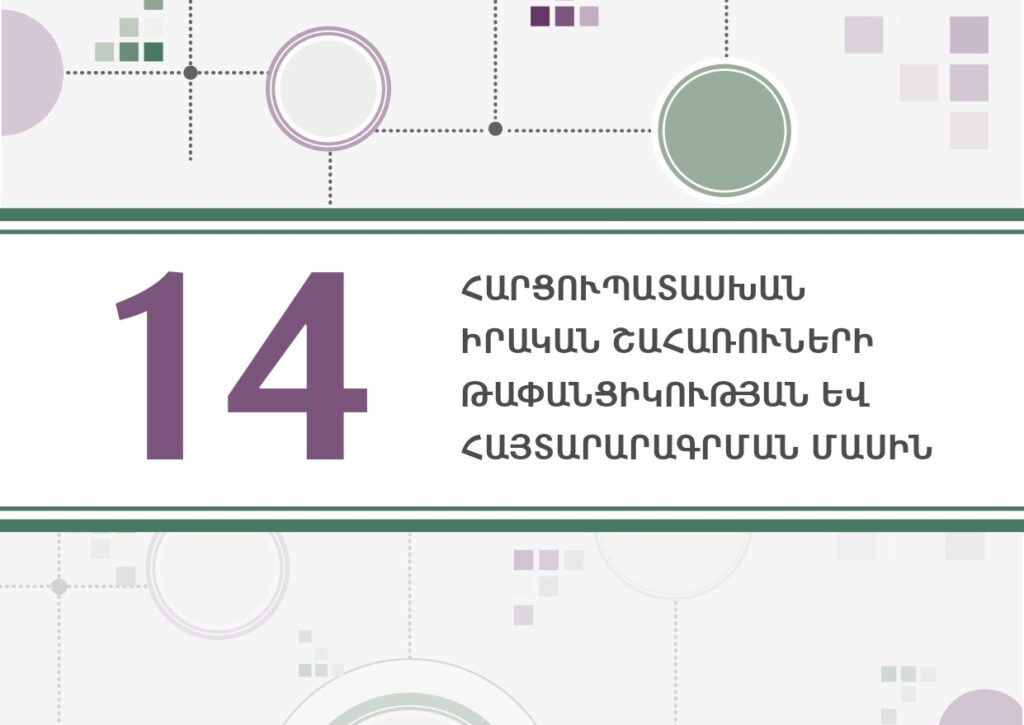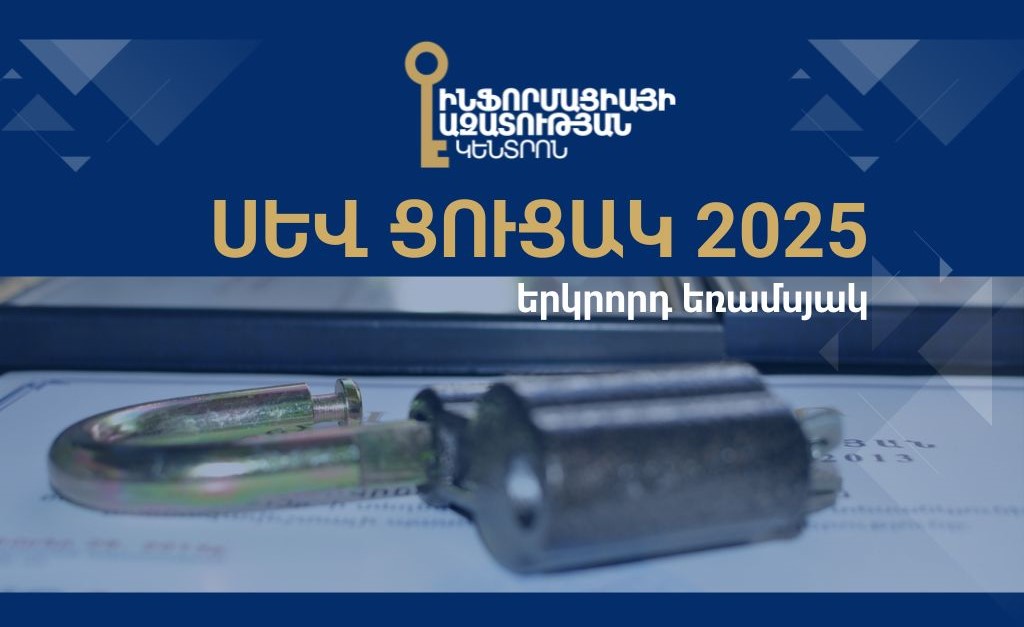The ARM GOV 17 February session defined the order and deadlines for receiving and maintaining announcements that are subject to public notification through the Internet. What do you think, will this government resolution function, taking into consideration the fact that the “Law on Public Notification through the Internet”, adopted in 2007, has hardly ever functioned?
SH.D.- “Freedom of Information Center of Armenia” much welcomed this step, because it was already more than three years that the Law existed, but de facto that order did not function. First it had a www.lraber.am address, which was later bought by someone named Vardan Tonoyan, who had nothing to do with the system. Hence, the implementation of the Law became impossible. Then www.azdarar.am was created, which only after the latest government resolution is ready as a technically saturated website, but is not yet open to public, because updates are being made. I might say that a technically really good working website has been created. Now the only problem is to make it really serve its purpose, so that all the official notifications are posted there with daily updates. And the work of journalists, NGOs and other citizens will be to keep a watch over the law implementation process… It is very important that there will be one source, and different contests, auction announcements and similar documents will appear on this website as defined by the Law. It is also important that each citizen or juridical person, who has an e-signature, will publish his announcements for free, instead of turning to newspapers and spending money.
According to article 1087.1 of the ARM Civil Code, for the first time this year a maximal penalty was imposed – the court forced “Armenian Times” (“Haykakan Jamanak”) daily to pay AMD 2mln 44.000 to each of the three deputies of the ARM National Assembly (Samvel Aleksanyan, Levon Sargsyan and Ruben Hayrapetyan) for slander. Do you view this as a limitation for freedom of speech, or a way to suppressing the anarchy of speech?
SH.D.- The court verdict obviously contradicts article 10 of the European Convention on Human Rights, according to which, every limitation must be defined by law, have a legal purpose, and be necessary for the democratic society. It seems to have a legal purpose, i.c. it is aimed at reestablishing the insulted reputation of three state government representatives, but it is not necessary for the democratic society… If they were casual citizens, I would definitely find the verdict to be just. But in this case they are government representatives, and their defence should be less, than that of casual citizens… We did not ask them to choose a status of constantly being under public attention on public platforms. This means that they have decided and ought to be ready for criticism… One more fact is also important: the court did not question information sources, not taking into consideration the fact that after the publication the media outlet disclosed the source of information, which in that case could be of core importance. This means, that the court did not let the media outlet defend itself. Moreover, the ARM “Law on Means of Mass Media” says that if the information is very important for the public, than despite the right for inviolability of personal life, some even slandering publications are permitted, if they have high public sonority. In this case there actually was such an issue, because it referred to three NA deputies at once. And it is also important to note that, as mentioned lawyer Ara Ghazaryan, such court verdicts leave freezing impact on the freedom of the media, meaning that other media outlets may think that they may also be penalized and may avoid publishing articles of public importance.
During the eight years of its adoption since 2003 how has the ARM “Law on Freedom of Information” been implemented? Which are the positive outcomes? And which are the gaps that have yet to be filled in a form of amendments in the Law?
SH.D.- This law launched an important process – began ensuring that those in power start thinking of working openly and of ways to ensure publicity. It is to say, that before the adoption of the Law scanty officials had ever heard of it. The Law put the beginning of traditions and processes, which is the most important achievement of the Law and our center. Today you may hardly find an official, who has not at least heard of the existence of the Law. And day by day the number of those, who turn to the help of the law, increases. If we speak about shortcomings, they mostly refer to the accessibility of electronic information, i.c. electronically applying and receiving answers. For this reason, by the initiative of our center, together with the National Assembly and the Ministry of Justice, we elaborated a legal reforms package, which is now in the agenda of the four-day NA session. It is already a year and three months that it is in the agenda – I cannot say why it is delayed, but I know that they have no alternative: either they have to take it out of the agenda or pass it. But I think they will pass it, because the Government has always responded positively to it. After the amendments the Law will also define how citizens can impose administrative sanctions on officials refusing to give information. Our organization has been able to win only one case, due to a judge named Arthur Poghosyan. The reason is not that judges do not want, but the Law does not give a full opportunity. Today the Law allows dual actions –protecting either freedom of information, or officials.
How do you think should human rights defender be?
SH.D.- Human rights defender should be daring and independent from those in power in all ways. He should really be able to view human rights not from a point of view of conscience, but from the point of view of human rights.
Which steps of “Freedom of Information Center of Armenia” in the recent years do you consider achievements?
Sh.D. -Finally a FOI non-formal educational center was established, due to which institutional bases were created, which are to provide periodical trainings for state and community employees in the sphere of freedom of information. It will show them their obligations in this sphere, and we can help them understand the implementation of those obligations. Trainings are organized in accordance to the program approved by the Civil Service Council, and the holding of the trainings is officially accredited to our NGO. Already 101 civil servants have been trained. After finishing with them we will pass on to community servants. By 2012 300 civil and 400 community servants will have been trained. On the one hand we are teaching, on the other hand we are trying to enrich court cases. I mean, we try to say, “Did you learn? From now on you may not say ‘Oh! We did not know that’s why we violated.’” Now you do have the knowledge and the information, thus, we will also watch that you use all of that in your work, too. And if you fail, we will take it to court.
Karine Ionesyan











